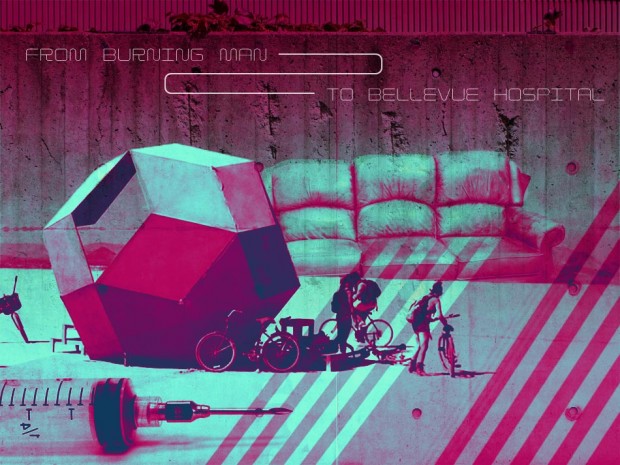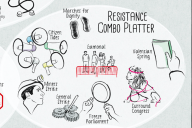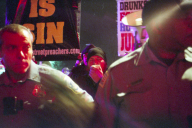In the deserts of Nevada and the psych wards of New York City, a man tries to live with his madness rather than have it bludgeoned out of him.
I will keep them from harm and injustice. […] In purity and holiness I will guard my life and my art.
– The Hippocratic Oath
“Apple hasn’t had a genius working for them since 2011!” I growled.
The scene at Apple’s flagship store on 59th Street and Fifth Avenue continued to escalate. It was just past 1am on a Friday night in mid-October, and I was a few drinks into the evening. To work off some of my nervous energy, I had decided this was a great time to bring my malfunctioning MacBook Air in for repair and to replace my recently deceased iPod.
The scene was fraught and I was more than mildly tipsy. For the past few weeks my mind had phase-shifted into an altered state. Not nearly as extreme as I had experienced in years past, but one that could be described as an emotional crisis of sorts. Was I going through a nervous breakdown, a meltdown, a manic episode, or a midlife crisis? Sometimes labels make all the difference.
“If you don’t get out of here, we’re calling the cops,” the blue-shirted Apple genius threatened. I hadn’t threatened anyone or damaged any property, so I defiantly taunted, “Go ahead. Call them.”
Over the past few years I have teased the Apple geniuses on more than one occasion. I’ve asked them how I could download the app which maps US drone attacks, one that the App Store had censored, and I’ve showed off my Android’s FM tuner which, unlike the Apple model, uses the century-old technology of radio to avoid devouring your data plan. I considered these interventions my solo-take on performance art or direct action, although admittedly they can be a bit dickish. But given that Apple’s corporate policies have been systematically eroding human and civil rights, sometimes I can’t help myself. While my banter with the retail staff may have been smug and inappropriate, it never crossed the line into criminal behavior.
When the police arrived I was composed and fully cooperative. I thought they would likely turn me out on the street. In cases like this, more benevolent officers have even been known to drive people home. At worst, I might face some kind of misdemeanor ticket, for mischief or disturbing the peace. I was genuinely surprised by their next move.
Instead of following any semblance of constitutional due process, the NYPD ignored my Miranda rights and proceeded to hand me off to the FDNY, who subsequently took me for a thousand-dollar ambulance ride to Bellevue’s emergency room. The firemen handcuffed me behind my back in a painful stress-position, banged my head a few times on the wall of the ambulance, and even mischievously tried to plant psychotic ideas in my head by claiming that their walkie-talkies didn’t work and that there are no WiFi or radio waves anywhere in the city.
When we arrived at the emergency room I was still handcuffed, and we waited around in discomfort for over an hour to see the attending psychiatrist. When he arrived he looked like he was sleepwalking, and my fireman escort goaded me into yelling at him to wake him up.
It was a horrifying situation—I was surrounded, restrained, and bracing myself for the inevitable. I didn’t hear the order, but I knew what was coming. They stuck me with a hypodermic needle attached to a syringe filled with Haldol. Haldol is a miserable first-generation neuroleptic (aka antipsychotic), whose short-term side effects include hallucinations, sedation, drooling, compulsive pacing, diarrhea, and muscle aches. I had pleaded with the doctor and nurses to take the medication orally, since that would have cushioned the anvil-like impact of the drug on my mind and body. I knew about the federal statute mandating that patients who are willing to take medication orally can’t be forcibly injected, but the law didn’t protect me that night. I was left on a stretcher writhing in restraints as the delusional psychosis of the antipsychotic set in. How many patients are assaulted daily in utter disregard of the doctrine to employ the “least restrictive method of constraint?”
![]()
I barely remember awaking inside the locked ward, but I do remember what I felt as my eyes opened. Disbelief. I couldn’t believe I was back again. It had been over nine years since my last hospitalization, and while I had traversed some tumultuous states of consciousness in the meantime, I had walked between the raindrops and managed my periodic emotional crises as an outpatient.
When I was a freshman in college I was diagnosed as bipolar. Sometimes I think a more accurate description for my condition is Post-Traumatic Childhood Stress Disorder, and to varying degrees, we all suffer from that. Although there was a history of madness in my family, one of my close relatives’ condition was always described as as a thyroid disorder—not as something with a DSM label. I later learned that they had been institutionalized for a year after they finished high school, and that they underwent electroconvulsive therapy for three years during my childhood. Additionally, my uncle committed suicide before I ever had a chance to meet him. He was a medic in the Korean War—Lord knows what he witnessed and endured—and jumped out a veteran’s hospital window.
That freshman year was intense for me. I didn’t really like my friends and I had my heart broken by an unrequited love. Much of the fall semester, I fantasized about hanging myself with my bicycle chain. I persevered, clinging to a quote that a friend shared with me — “Sometimes it takes a lot of courage to stay alive.” By the following spring, I bounced back, In fact, I bounced back like a glitter-filled Super Ball. As has happened many times since, my psychological immune system transformed my intense psychic and emotional pain into (sometimes inappropriate) giddiness, euphoria, and energy. Once I figure out how to bottle this, I’ll be a billionaire. Or we’ll all be locked up psych wards.
I spent that spring running around barefoot like Socrates, putting out cigarettes in my palm, going to punk shows, and expressing righteous indignation at unsuspecting (and sometimes undeserving) targets. It ended when I was brutally hospitalized, spending weeks subjected to physical and psychological violence. After two court trials and a transfer to another facility, I managed to elope during a group outing and was finally free. In a plotline lifted from the pages of a comic book, I’m an escaped mental patient who has gone on to investigate corruption in psychiatry and the pharmaceutical industry.
The system caught up with me many times over the years, and I have been institutionalized more times than I prefer to count. These experiences have been uniformly violent and traumatizing. I’ve never attempted suicide, and have only been hospitalized for what they call “manic” episodes. Though I have suffered from melancholy, I have developed coping mechanisms that guide me through those periods with as little drama as possible. Over the years I have developed various strategies to help manage my dangerous gifts starting with taking care of the basics (nutrition and sleep), cultivating a peer-support network, and developing a “mad map.” I have also developed the confidence to believe that “this too shall pass,” and have faith that the bad will wane and the good will wax.
![]()
In the summer of the 2013—the months preceding my fateful trip to the Apple Store—I was yearning for a vision. I had been in an emotional desert for a while, with no oasis in sight. I’ve known about Burning Man for over a decade, and had always been curious, but never quite sure how to pull off the logistics of spending a week in the desert on the other side of the country. Burning Man is not for the faint of body or mind. The conditions are incredibly hostile, with temperatures sometimes exceeding 110 °F by day and dropping to almost-freezing at night. There are blinding dust storms, and the acidic playa dust can wreak havoc on your skin. But, the experience promised to be unique—visually, socially, and experientially. I entered with eyes wide open, aware that the sleep deprivation and the sustained stimulation might be triggering. My sister played Cassandra, warning me against making the trip and I promised her I would avoid experimenting with hallucinogenic drugs, and be mindful of my emotions.
My time at Burning Man felt, appropriately, like a controlled burn. I distinctly remember feeling that I was _simulating_ my psychic extremes, rather than actually experiencing them. I was simultaneously a detached observer of my emotions, while at the same time being fully present. The experience was incredible, and almost indescribable. I’ve compared Burning Man to a cross between District 9, Tron, and Dr. Seuss, but that was just my perspective. With upwards of 70,000 people in attendance, the event was a vibrant metropolis. Its attendees call that stretch of desert Black Rock City, and like any big city, its citizens each experience it differently.
It all felt like an altered state to me. Many of the costume props I had brought along were souvenirs I acquired during my episodes over the years. Impulsive shopping sprees are one of the odd characteristics of my extreme states, and I suddenly realized that all of my eccentric crap felt completely at home at Burning Man. The resonance helped me connect with those extreme states of mind and gain a bit more insight into their roots and causes. I wondered: Could I return back into the cave of my everyday life and preserve these insights once I was re-shackled, stuck staring at the dancing shadows?
On my third night, I finally ventured out into the Deep Playa, a sparse expanse of Black Rock City away from the camps, parties, and most of the people, dotted with errant sculptures and other art installations. I climbed inside a sacred-geometric structure called “the transportal” that was designed to tune the passengers inside to each other’s frequency. It worked. I made quick friends with former strangers, and we explored a terrain that resembled nothing so much as the far side of the moon. We came across an upside-down couch that we were convinced had teleported there from the previous year. I took one of its cushions and returned to the portal, only to find a friend of mine inside it. We hadn’t seen each other all day, but he had just been complaining that his ass hurt. Somewhere along this journey of synchronicity, I had been gifted an old-fashioned skeleton key. In the context of the night, it was a master key, my key to the portal and beyond. The line between inner and outer was blurred at Burning Man, and manifesting and wish fulfillment were regular occurrences. The world was saturated with meaning, and everything was interconnected—a semantic synesthesia where every perception was infused with meaning. It was the external manifestation of some of my most intense inner journeys.
![]()
The emotional challenge of returning to the default reality post-Burning Man is a well-known phenomenon. Burners sometimes call it “re-entry.” In the aftermath of such utopian beauty, it’s common to struggle to understand why the world must function as it does. Why don’t people greet each other with hugs? Why is it so hard to meet new people? Why is sharing property so difficult? A week is just about enough time to immerse yourself in a foreign culture and begin to internalize it. From what I hear, many attendees have survived the playa, but burned up on reentry. Before for my trip I found telephone books’ worth of guidance for burners on how to prepare for their trip, but next to nothing on how to prepare for the return.
I took a few days off work after Burning Man to help decompress. I booked a short stay at a hotel in Westchester that, I discovered, also served as a Pfizer training facility, like something out of Love & Other Drugs. Through conversations I learned that Pfizer and Monsanto used to be the same company. Somehow the magic of the playa had followed me home. There were no coincidences. Only beautiful narratives, where often I was the hero.
After the Burning Man vision quest, I realized how discontent I had become with my life, especially at work, and I flailed about desperately to affect a change. The Snowden leaks that summer only served to compound my passions and convictions, fueling my overactive imagination and leading to a sensational theory that the NSA is building a time machine. I basically threw a psychic temper tantrum as I desperately tried to process the rush of insights, emotions, and revelations.
My tantrum landed me in a locked ward, a brutal experience that I wouldn’t wish on anyone. While Bellevue delivered surprising moments of empathy (e.g. while dancing to Michael Jackson’s “Thriller” on a Nintendo Wii during Video Game Therapy), overall the experience was violent, traumatizing, and humiliating. I witnessed systemic racism, abuse of veterans, and simple, old fashioned cruelty. One gentleman who kept getting reprimanded for yelling, needed a lozenge, not an antipsychotic. Most of the nurses refused to respect the gender pronoun preferences of a transgender patient, and insisted on calling her “him.” A Pakistani woman who spoke very little English was detained against her will and forced to miss her flight home with no explanation (or translation). Many of the people working at Bellevue were in the right ward but on the wrong side of the nurse’s desk. My psychiatrist was downright combative, intrusive, and aggressive, exhibiting many of the symptoms that had gotten me incarcerated. Had I followed the behaviors she modeled, I would have been shot with a syringe full of Haldol and thrown in seclusion. It was enough to drive a sane man crazy. The nastiness and hostility of the staff was evident to all of my friends who visited the ward. I was blessed and privileged to have a steady stream of visitors, and I honestly don’t know how I would have survived without them.
![]()
When I earned my master’s degree, I donned the goofy ceremonial robes and walked with my classmates at the university-wide commencement. I distinctly remember my astonishment when I heard the medical graduates recite the Hippocratic Oath, right there on the quad for all of us to witness. I remember thinking to myself that other professionals should be required to recite oaths too, as lawyers, teachers, journalists, and others all have the power to do great harm. But, I suppose that medicine still occupies a unique place, as the power to heal is synonymous with the power to kill.
The psychiatric-pharmaceutical complex is currently violating the Hippocratic Oath. I realize that this is a heavy accusation to make, but the field has gone beyond simple, or even gross negligence, and has crossed the line into willful harm. Consider that pharmaceutical companies aren’t bound by a coherent code of ethics—their charters don’t contain anything like Google’s “Don’t be evil,” and their employees aren’t required to take the Hippocratic Oath upon hire. Their sole responsibility is to maximize shareholder value so the shareholders don’t go somewhere else and buy shares in oil instead (and increasingly, that includes breaking the law as the calculated cost of running a profitable business). I’m under no delusion that adopting language like this would instantly reverse decades of malfeasance, but a formal reminder that that employees have responsibilities more important than profit-seeking might help generate a few more whistleblowers in the pharmaceutical industry.
As for the systematic erosion of our civil and human rights, I’m disgusted, but not surprised. Oppressive governments of all ideological stripes have a long history of locking up dissidents with opposing views, and the production of mental illness has historically functioned as a disciplinary mechanism for hierarchical societies. Due process? One psychiatrist, with a wink to a second can take away someone’s freedom indefinitely. You may be initially locked up for being a threat to yourself or to others, but once inside, you won’t be released until you can perform “normal.” Thoughts become crimes, punishable by forced restraints, chemicals, and seclusion. And, even today, they are sometimes punishable by involuntary forced electroshock.
And the statistics all scream that it’s getting worse, but in slow motion so not too many people notice. I keep meeting people who were pulled into the psychiatric system at younger and younger ages–12, 8 and as even toddlers. Law enforcement and others in positions of authority are increasingly fearful and risk averse. Their skittish paranoia has claimed collateral damages. Curiosity and difference are viewed with suspicion, and risk itself has been pathologized as psychiatry begins to preventatively diagnose and treat a new generation of customers.
It feels like deviance is being corralled and relegated to temporary autonomous zones like Burning Man in an attempt to suppress these instincts and confine them to the margins. But, just as anti-bacterial soap has a tendency to select for super-bugs, I am optimistic that these acts of suppression will yield a new wave of resistance. Whoever survives this attempted genocide on creativity and deviance will emerge stronger, strong enough to help transform the madness that passes for mainstream rationality into a permanent autonomous zone. In a world where violent, self-destructive, and even suicidal policies are regarded as sane, it’s the captains of government and capital that need to be restrained. War criminals, environment destroyers, and compulsive usurers walk free while those who speak truth to their power are incarcerated. Our consensual reality is crazy sick, and desperately needs an imagination infusion.
To anyone going to Burning Man this year, please bring back some dreams. We need your inspiring craziness in the real world.
*
If you are interested in helping to create alternatives to the mainstream psychiatric-pharmaceutical approach to mental health, please visit http://theicarusproject.net.
____________________________
Art by Kevin TS Tang.


















